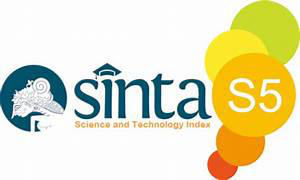PERKEMBANGAN INDUSTRI HALAL DAN PERANAN BADAN SERTIFIKASI HALAL JEPANG DALAM MENINGKATKAN INDUSTRI HALAL PADA MASA PEMERINTAHAN SHINZO ABE
Abstract
Abstract
This study aims to analyze the development of the halal industry and the role of Japanese halal certification bodies in improving the halal industry during the reign of Shinzo Abe. The method used is the library method. The results of the study indicate that there are various backgrounds that have led to the development of the halal industry in Japan, giving rise to the Japanese government's efforts to carry out halal certification of various products and other facilities. These various backgrounds include the decline in the population in Japan, so that the level of consumption of the people also decreases, the increase in the world's Muslim population which has great potential as a market share for various Japanese products so that this becomes a target to attract tourists. This is also supported by the increasing Muslim population in Japan. Meanwhile, the role of halal certification in various Japanese products is a requirement that must be met in order to be able to produce and market their products both domestically and for export to various Muslim countries. Halal product certification was widespread during the Shinzo Abe administration.
Keywords: Economic strategy, halal certification body, muslim tourists
Abstrak
Penelitian ini ditujukan untuk menganalisis perkembangan industri halal dan peranan badan sertifikasi halal Jepang dalam meningkatkan industri halal pada masa pemerintahan Shinzo Abe. Metode yang dipergunakan adalah metode kepustakaan. Hasil penelitian menunjukkan bahwa terdapat berbagai latar belakang yang menyebabkan berkembangan industri halal di Jepang sehingga memunculkan upaya pemerintah Jepang untuk melakukan sertifikasi halal terhadap berbagai produk dan fasilitas lainnya. Berbagai latar belakang tersebut di antaranya adalah menurunnnya jumlah populasi di Jepang, sehingga tingkat konsumsi masyarakatnya juga mengalami penurunan, meningkatnya populasi Muslim dunia yang sangat potensial sebagai pangsa pasar berbagai produk Jepang sehingga hal ini menjadi target untuk menarik wisatawan. Hal ini juga didukung oleh semakin meningkatnya populasi muslim di Jepang. Sementara itu peranan sertifikasi halal dalam berbagai produk Jepang merupakan syarat yang harus dipenuhi agar dapat memproduksi dan memasarkan poduknya baik di dalam negeri maupun untuk ekspor ke berbagai negara muslim. Sertifikasi produk halal marak dilakukan pada saat pemerintahan Shinzo Abe.
Kata kunci: Badan Sertifikasi Halal, strategi ekonomi, wisatawan muslim
References
REFERENSI
Adidaya, Achmad Yoza. (2016). Halal in Japan: History, Issues and Problems: The Effect of The Halal Boom†Phenomenon on Japanese Society and Industry. Departement of Culture Studies and Oriental Languages.
Fujiwara Tatsuya, Risyawati. (2017). Issues of Japan Halal Industry: An Exploration of Potential Obstacles to Japanese SMEs Export Development. Int.J Sup.Chain.Mgt, Vol.6,No.2 June 2017
Halal Japan Corporation. https://www.jp-halal.com/english-top International Recognition of
Halal Certification Body. https://mpja.jp/en/international_recognition/
Konety et.al. (2021). Japans Rational Choice in Developing the Halal Industry. Mimbar,Vol.37, No.1st (June,2021), pp.00-00
Mori Takayuki. The Present Condition and Subject of Halal in Japan, In Comparison with
Malaysia. Fakulty of Commerce,University of Marketing and Distribution Sciences
Sulong,Husain,ed.all.,ed (2020). Halal Food Facilities in Japan from The Perspective of Malaysian Muslim Tourists. International Journal of Academic Research in Business & Social Sciences. Vol.10,No.11 Pg.180-192
Yusof Md Shazlinda, Shutto Noriyuki. (2012). The Development of Halal Foof Market in
Japan: An Exploratory Study. Procedia: Social and Behavioral Sciences 121 (2014) 253-261
Yakin Utiriza Ayang. (2017). Halal Food, Identity, and Authority in Japan. https://www.researchgate.net/publication/317230854
DOI: 10.33751/wahana.v27i2.4544
Refbacks
- There are currently no refbacks.

This work is licensed under a Creative Commons Attribution-ShareAlike 4.0 International License.













